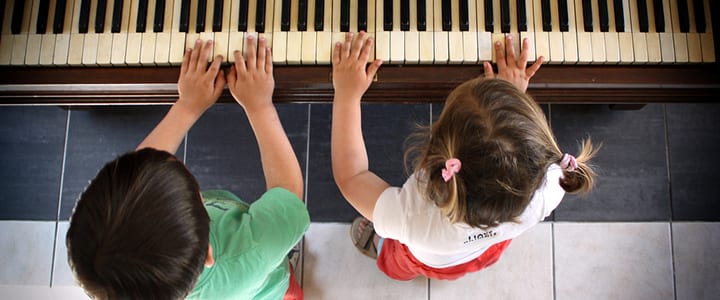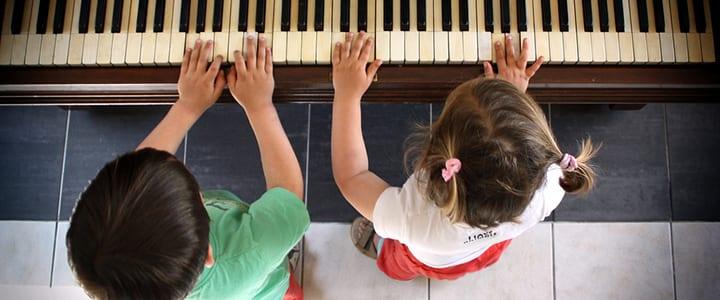 Studies show, time after time, that music lessons in early childhood are essential for creating neural pathways for brain development. They also give children a head start on creativity and self-expression. Music was likely our first language as human beings, and it still provokes a very primal response in us – anybody from anywhere in the world can listen to a song and know what emotion it is trying to convey.
Studies show, time after time, that music lessons in early childhood are essential for creating neural pathways for brain development. They also give children a head start on creativity and self-expression. Music was likely our first language as human beings, and it still provokes a very primal response in us – anybody from anywhere in the world can listen to a song and know what emotion it is trying to convey.
If you ask an adult if they took piano lessons as a child, many will say yes. Then, if you ask them if they “stuck with it,” or, at least, enjoyed their time while learning, you are bound to get mixed results. “Music lessons enriched my life…” “I hated it…” “I still love to play sometimes…” “I will never put my kids through it…” Clearly, there are right ways and wrong ways for how to teach piano to kids, and only some parents and teachers get it right.
How to Teach Piano to Kids: What Can I Do, as a Parent?
Remembering these guidelines will help you set your child up for a lifetime of great habits:
- Ask your teacher if you can be present for some of the lessons. This will help you understand how your teacher and your child interact, as well as give you the opportunity to see what kinds of material they are working on. Of course, check in with your child on this, too – some kids get nervous or may feel like you’re intruding on their independence.
- Sit within listening distance of your child while they are practicing at home. Take this time to catch up on a book or magazine, and periodically encourage them with positive praise. You can also ask questions about what they’re playing, or help them if they get stuck or frustrated.
- Take piano lessons at the same time. Be a terrific role model by practicing what you preach, and show your children that you are as human as they are when it comes to making mistakes. Bonus: Playing duets together can be a great way to bond!
- Even if you don’t take lessons along with them, learn enough about the piano that you can answer simple questions about their technique at home.
- Help your child set practice and achievement goals, and celebrate meeting them.
- Choose practice time wisely. Be sure that your child is not hungry, and has had sufficient outdoor or other physical playtime before practice begins. It’s very hard for a kid to concentrate when they have a growling stomach, or a raging case of the wiggles! Try to schedule practice for the same time each day, and let your child know in advance that it’s time to sit down and get some playing done.
- Make it fun. This is crucial for younger students. Try playing games on the piano, such as “Higher or lower?” and “Same or different?” Let them compose their own music to share with you; ask them to tell a story that goes along with their song.
- Follow your child’s cues. Forcing students to play music that they just aren’t into is never good for morale, no matter what their age. Find songs that he or she will love to play, such as pop music, or fun classical pieces that they have heard before. After they start to love practicing, then you and their teacher can push the boundaries a bit into unfamiliar territory.
- Listen to music at home and in the car. It really doesn’t matter what you listen to – rock, country, classical, pop, or indie – what matters is that you let your kids see you bebopping along to it. Encourage singing and dancing as much as possible!
- Use your gut about their teacher. Often, finding the right teacher comes down to personal preferences. Don’t be afraid to try another teacher if it’s not working out, or if your child seems downright miserable before or after lessons.
How to Teach Piano to Kids: Finding the Right Teacher
As you can see, parents play a big role in understanding how to teach piano to kids. When it comes down to the actual material, however, you’ll of course need to find a qualified and safe piano teacher. And for kids in particular, finding the right teacher match is crucial to keeping them interested and engaged in their lessons. Most kids have shorter attention spans, for example, and a teacher with experience working with children can be a huge help.
What qualities and teaching styles should you look for? Here are some ideas:
- Experience working with kids. As mentioned above, selecting a teacher who has the right experience will absolutely help. These teachers will know how to deliver feedback in a way your child can understand it, say just the right things to keep the motivation high, and remain positive in the face of frustration.
- Positive studio atmosphere. Does the teacher work to minimize distractions, such as people (or pets) walking in and out of the area? Once your child starts thinking about or looking at other things, it can be hard to get back on track.
- Glowing recommendations. Checking out feedback from current and past students can help you sort out the teachers who will be a good match for your child. Look for teachers who are patient, friendly, and motivating.
- Passion! Kids who see how passionate their teacher is about music will often develop the same attitude. Piano lessons for kids should be rewarding and also fun. Without that added excitement, kids may start to resent the lessons.
We hope these tips will help you understand how to teach piano to kids, from a parent’s perspective. Continue encouraging and supporting your child, and your little Mozart will be mastering the keys in no time.
Photo by followtheseinstructions
Megan L.

